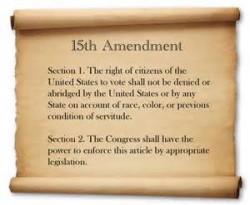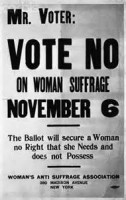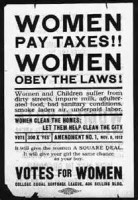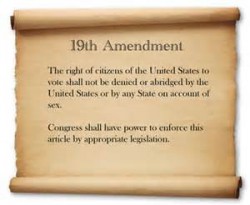 “The right of citizens of the United States to vote shall not be denied or abridged by the United States or by any State on account of race, color, or previous condition of servitude.”
“The right of citizens of the United States to vote shall not be denied or abridged by the United States or by any State on account of race, color, or previous condition of servitude.”
These are the 34 words that make up the 15th amendment, passed in 1870.
“The right of citizens of the United States to vote shall not be denied or abridged by the United States or by any State on account of sex. “These are the 29 words that make up the 19th amendment, passed in 1920.
 The 19th amendment was debated, ridiculed, and championed for 71 years before it was passed. A war fought with words. The opposition argued that most women really didn’t want the vote and were probably not qualified to exercise it, anyway. In rebuttal, writer Alice Duer Miller responded with this list:
The 19th amendment was debated, ridiculed, and championed for 71 years before it was passed. A war fought with words. The opposition argued that most women really didn’t want the vote and were probably not qualified to exercise it, anyway. In rebuttal, writer Alice Duer Miller responded with this list:
- Because man’s place is in the army.
- Because no really manly man wants to settle any question otherwise than by fighting about it.
- Because if men should adopt peaceable methods, women will no longer look up to them.
- Because men will lose their charm if they step out of their natural sphere and interest themselves in other matters than feats of arms, uniforms, and drums.
- Because men are too emotional to vote. Their conduct at baseball games and political conventions shows this, while their innate tendency to appeal to force renders them unfit for government.” **
Wow. This goes to show that sexism has existed a long time, doesn’t it? Once again, words led the attack - by a female writer, no less.
 But this was not a battle of the sexes. There were men and women on both anti- and pro-suffrage forces. Then President Wilson, in a speech before Congress in September, 1918, gave the movement his support. In early 1919 the House of Representatives passed the 19th Amendment, and on June 4, 1919, the United States Senate also endorsed it. But with 35 of the necessary 36 states needed to ratify the amendment, the final vote came down to a 24-year-old anti-suffrage supporter named Harry Burn.
But this was not a battle of the sexes. There were men and women on both anti- and pro-suffrage forces. Then President Wilson, in a speech before Congress in September, 1918, gave the movement his support. In early 1919 the House of Representatives passed the 19th Amendment, and on June 4, 1919, the United States Senate also endorsed it. But with 35 of the necessary 36 states needed to ratify the amendment, the final vote came down to a 24-year-old anti-suffrage supporter named Harry Burn.
Realizing that he had the deciding vote, he considered his mother’s words and decided to vote as she had urged him. And so, on August 18, 1920, the amendment was ratified in Nashville, Tn.
All that fuss over 29 words. And all the changes created by 63.
In fact, the “right to vote”, in its purest definition, is an ongoing struggle. The constitution is very vague in defining it. The original document gave voting rights to white male landowners only. Now there are issues over residency, poll taxes, timely registration, identification and whether convicted felons should have the right denied to them. We still fight these battles with words. Proposals and amendments, trying to perfect the ideal.
Men lost their lives fighting for the right to decide the rules by which our country would live. Women argued for the right to take their place beside the men 100-plus years later. Whether won by war or by the power of words, the right to vote is one that should be appreciated. To discard it is to dishonor the people who battled for it.
Make your ancestors proud. Make their words count.
 Exercise your right to vote.
Exercise your right to vote.
http://www.usconstitution.net/constnot.html
** http://womenshistory.about.com/od/suffrage1900/a/august_26_wed.htm






Good reminder for us take advantage of our freedom to help choose who leads us. I voted and I am again grateful to live in the ole USA.
Very interesting story about Harry Burn. I had never heard it.